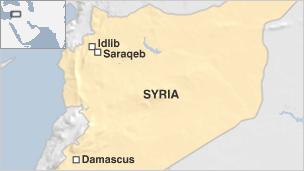Red Cross workers kidnapped in Syria
- Published

The International Committee of the Red Cross (ICRC) says gunmen have abducted six of its workers and one Red Crescent volunteer in north-west Syria.
The aid agency has had no contact with the gunmen, an ICRC spokesman says.
Earlier, Syrian state media said gunmen had opened fire on Red Cross staff travelling on the road between Sarmin and Saraqeb in Idlib province.
The ICRC says it has been struggling to gain access across Syria to provide aid to injured and displaced people.
Appeal
Rima Kamal: 'Since yesterday noontime we have not had any contact'
A convoy carrying six ICRC staff members and one Syrian Arab Red Crescent volunteer was intercepted by unidentified armed gunmen near the town of Saraqeb in Idlib province, ICRC spokeswoman Rima Kamal told the BBC.
"We call for the immediate release of the seven colleagues abducted this morning... who work tirelessly to provide assistance to those most in need in Syria. Incidents such as this one unfortunately will undermine our capacity to assist those who need our help," she said.
The ICRC has declined to reveal the identity, gender or nationality of the abducted workers but they are believed to include both local and international staff, who are mainly medical specialists.
Syrian state news agency Sana earlier quoted an unnamed official as saying the workers were abducted and taken to an unknown location after gunmen blocked their path and shot at their convoy.
The aid agency did not confirm whether shots had been fired, but said the team's vehicles were also missing.
An ICRC statement, external said the vehicles they were travelling in had been clearly marked with the Red Cross emblem, "which is not a religious symbol".
ICRC's Magne Barth said: "We expect that all armed groups, all authorities respect independence"
Another ICRC spokesman, Simon Schorno, told Associated Press the attack took place at around 11:30 (08:30 GMT) on Sunday as the team was returning to Damascus.
He said the team had been in the field since 10 October to assess the medical situation and deliver aid in what he described as "a difficult area to go in".
It is not yet clear who carried out the kidnapping, but Syrian state TV blamed it on what it called "armed terrorists" - a term it frequently uses to describe anti-government rebels.
Hardline Islamist rebels are known to operate in the area, says the BBC's Jim Muir in Beirut.
Kidnappings, particularly of aid workers and journalists, have become increasingly common in the north, where much of the countryside has fallen into rebel hands.
In August, the ICRC said the number of Syrian Arab Red Crescent volunteers who had lost their lives since the start of the conflict had risen to 22.
The abductions will clearly complicate further the already difficult and dangerous task of providing humanitarian aid to all parts of the country, he adds, at a time when the UN is pressing all sides to allow freer access.
On Saturday, the Syrian government began the evacuation of around 1,500 civilians, mainly women and children, from a rebel-held Damascus suburb besieged by the army for months.
Many of those coming out of Muadhamiya, south-west of Damascus, were said to be exhausted and traumatised.
In a separate development, the state news agency said two car bombs exploded on Sunday evening near the state TV building in Damascus.
The TV headquarters in the capital's Umayyad Square was reportedly damaged in the attack, but there was no immediate word on casualties, the agency reported.
More than 100,000 people have been killed since the uprising against President Bashar al-Assad began in March 2011, according to the UN.
Earlier this month, the UN estimated that more than eight million Syrians could have been forced from their homes by the country's civil war by the end of 2014.